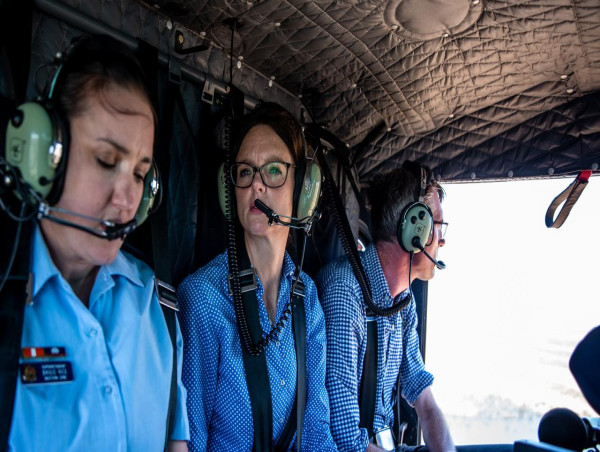Despair and dust hung heavy in the air one week after a ferocious flood ripped through the small town of Eugowra.
As a pack of politicians and media waited for the prime minister to arrive at the local showground in central west NSW on a chilly November morning, a man in an oversized black tracksuit tentatively approached, downcast and dazed.
Emergency Services Minister Steph Cooke and Premier Dominic Perrottet quickly recognised him as the local shopkeeper, whose sister died in the flash floods.
Away from the crowd, Ms Cooke and Mr Perrottet offered quiet words of comfort and wrapped their arms around him.
Ms Cooke, who was promoted to oversee the state's disaster response weeks before record-breaking floods decimated the NSW Northern Rivers, has faced many moments like this over the last year.
She developed a natural way with people in the depths of grief as a child, watching her parents run a funeral business next door to the family's home in the Riverina town of Temora.
"From a very early age my siblings and I had an insight into individual, family and collective grief," Ms Cooke told AAP.
"Like any other teenager, I was pretty embarrassed by what mum and dad did and made the joke from time-to-time that no one wanted to have sleepovers at my place.
"But one thing that was instilled in us was that it costs you nothing to be kind, that you don't know what another person is going through, that you should treat everybody the same no matter where they come from."
The Nationals MP was elected as the member for Cootamundra in a 2017 by-election, while she and her mother ran three floristry shops across the rural district.
The pair made floral arrangements for weddings - accepting the occasional request to recreate Princess Diana's bridal bouquet - while also helping communities welcome babies and farewell loved ones.
"I'm no expert but those experiences have assisted me to connect with people at times when they need it," Ms Cooke said, while on her way to open a new bowling green in her electorate.
Ms Cooke, a regular at country shows, community events and an avid promoter of small businesses, is expected to convincingly retain her seat at next weekend's election.
Her selection as a candidate and style of traditional grassroots campaigning could serve as a model for the party, which lost key rural seats to the Shooters in 2019 amid rising sentiment the Nationals had abandoned their loyal base.
At last year's Victorian election the National Party recovered from a similar shift, winning back three seats from independents.
Nationals Victoria leader Peter Walsh said it was down to finding people who would meaningfully connect with their communities.
Shepparton's Kim O'Keefe and Mildura's Jade Benham were both local business owners who had served as mayors before winning their seats from independent incumbents.
Morwell MP Martin Cameron was a plumber and gasfitter with a long history in local sport and small business in the Latrobe Valley.
"It was good research about what the issues are … and then having a good viable solution to put to the people," Mr Walsh told AAP.
"And recruiting people who were already local champions that wanted to take that next step in representing their community."
In NSW, regional votes will be key to a coalition win, but the Nationals face a fight in several marginal seats including Tweed, the Upper Hunter, Monaro and the Shooters-turned-independent seats of Barwon and Murray.
Dr Stewart Jackson, a senior lecturer in politics at the University of Sydney, said the move away from the Nationals may linger as poor rural health outcomes and centralisation of services was front of voters' minds.
"The Nationals will be winning or losing on how regional people perceive their real options," Dr Jackson said.
"If there hasn't been the benefits flowing to the regions, then why would you return to the Nationals?"
He said the last two federal elections demonstrated the need to understand individual regions.
"You can't take a state as being homogenous," Dr Jackson said.
"There's a whole range of different regions with different demands on them. Different issues affect different localities and different sets of people."
Not all disaster-affected communities in NSW have been satisfied with the government's approach, as many expressed frustration with delayed funding or felt forgotten once politicians and the media left town.
Ms Cooke said no response was ever perfect, but the independent flood inquiry and the establishment of the Reconstruction Authority represented meaningful change.
After a long year, Ms Cooke is grateful for her time with people who have endured the worst.
"I have seen people who have lost everything, but who are putting their own needs aside to help others," she said.
"I've seen that over and over again and that gives me strength in return.
"It allows me to keep pressing on."






